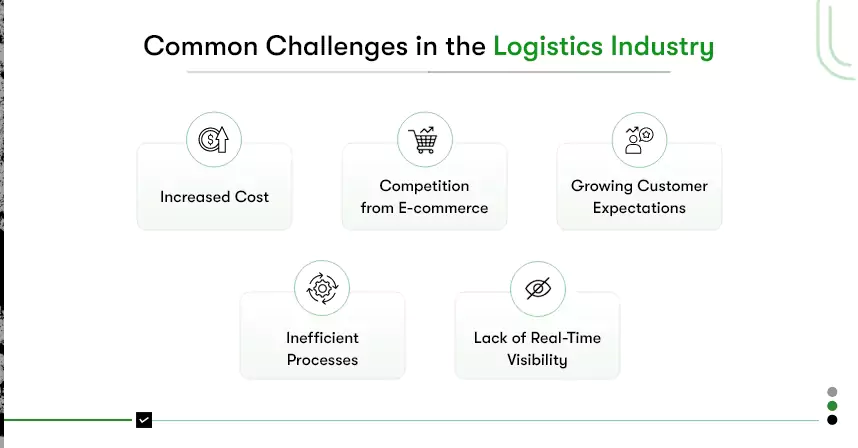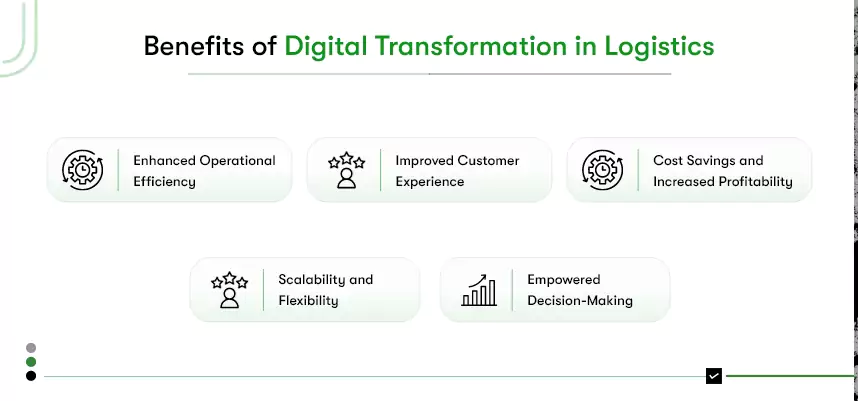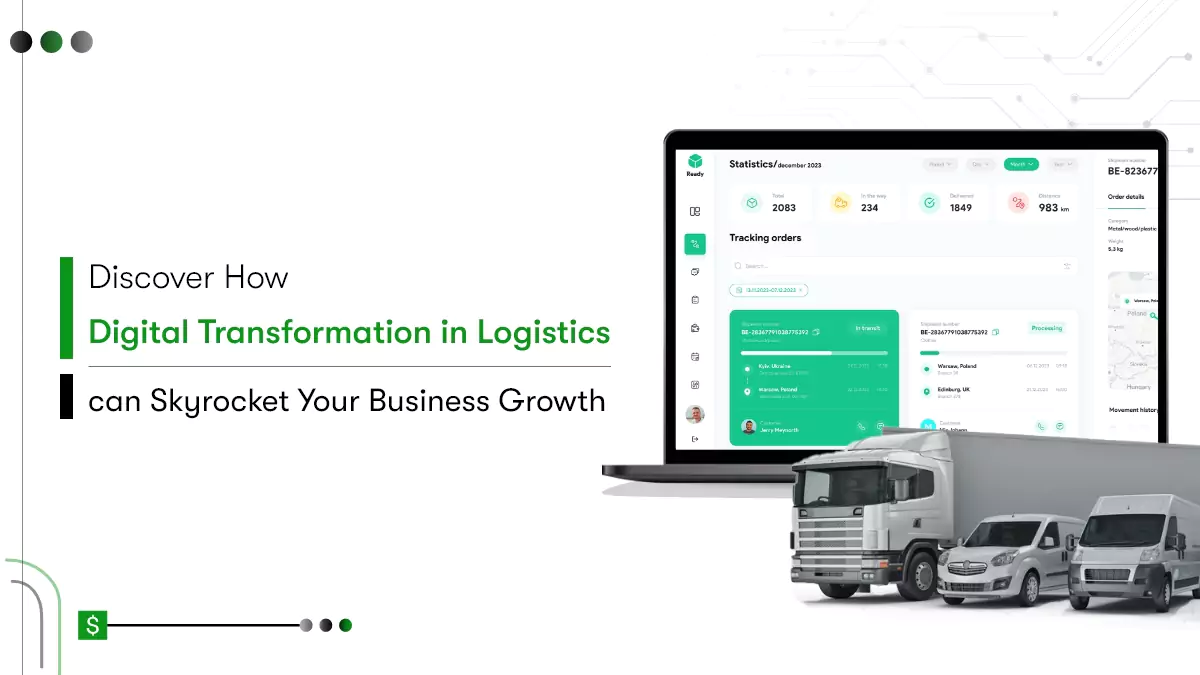The logistics industry is constantly facing challenges that impede growth and efficiency. These challenges, ranging from poor employee management to supply chain disruptions, may seriously hinder a business’s capacity to grow and succeed.
Traditional working methods often fail to address these issues, leading to missed opportunities and mounting frustrations.
One of the most critical challenges is supply chain inefficiency which will cause delays, raise costs, and make the customers unhappy. Managing day-to-day operations with outdated systems exacerbates these problems, causing further disruptions and inefficiencies.
Additionally, warehouse and inventory management often suffer due to a lack of real-time data and automation, leading to stock discrepancies and lost revenue.
The consequences of these challenges go as far as impacting customer satisfaction, operational cost, and, indeed, overall business performance. No question: those businesses that fail to address these pain points will be left behind by their competitors, who are already reaping the full benefits of advanced technologies to streamline their operations.
However, there is a solution that can transform these challenges into opportunities: digital transformation in your logistics business.
According to McKinsey, 70% of logistics enterprises are now embracing digital transformation, reaping significant benefits in the process. By adopting digital logistics innovation, companies can enhance warehousing, optimize inventory management, and improve supply chain capabilities.
Ready to embrace digitalization in your logistics operations? Digital transformation can unlock unprecedented growth and efficiency. In this blog, we will explore how digital technology is revolutionizing logistics and offer practical insights for implementing the solutions effectively.
The Power of Digital Transformation in Logistics
Today, significant logistics challenges are high logistics costs, competition with e-commerce, and increased customer demand for faster and faster delivery. Added to these are the pressures of higher costs that companies face that require personalized customer services to try and manage margins.
However, the digitalization of logistics can easily overpass the roadblocks. The challenges are real. Nevertheless, logistics digitalization very comfortably overcomes them all.
Did you know the global logistics industry is projected to grow to $9.41 trillion by 2028? Despite this promising growth, many logistics companies struggle to stay profitable. Both operational costs and customer demands are rising.
Changes are going on within the logistics industry concerning the costs involved. The costs for fuel, labor, and maintenance of the fleet and warehouse are increasing. All these eat into profits, making it hard for business operations to remain competitive.
The logistics landscape changed with the coming of e-commerce. Currently, customers are increasingly expecting faster, more reliable delivery of goods, which contributes to the momentum for logistics companies to improve.
This is where digital transformation can assist logistics companies in addressing the challenge. Using a positive approach, digital solutions increase efficiency, reduce costs, and delight customers’ experiences.
Why Do Businesses Need Digital Transformation in the Logistics Industry?
Digital transformation in logistics involves using technology to improve how logistics companies operate. This can help address the many challenges mentioned earlier. With the correct digital tools, logistics companies can ensure efficiency, reduced costs, and proper responsiveness to customer demands.
Addressing Rising Costs
Among the major concerns for logistics companies are rising costs. For example, digital transformation can help in controlling fuel consumption, reducing labor expenses, and arranging work at warehouses, among others. All of these will yield savings and better profit margins.
Tackling E-Commerce Competition
E-commerce has transformed the logistics landscape. Today, fast, dependable delivery is becoming a standard. Digital tools can help logistics companies meet these expectations. For instance, logistics digitalization can improve route planning and delivery schedules, ensuring packages arrive on time.
Meeting Customer Demands
Customers want their orders quickly and accurately. Digital transformation helps logistics companies improve their services. Warehouse management or transportation management software can enhance inventory tracking and order fulfillment. This ensures customers receive their products faster and more reliably.
Key Digital Tools for Logistics
Several digital tools can help logistics companies transform their operations into super-efficient, streamlined, and easy-to-manage systems. These are:
- Fleet Management Software: Things like monitoring and managing vehicles, hence reducing maintenance costs and overall better delivery efficiency.
- Process for Developing Logistics App: Creating custom logistics apps can streamline numerous operations, from order processing to final delivery. Therefore, these tailor-made apps ensure efficiency and accuracy at every stage of the logistics process.
With the rise in digital transformation, the logistics industry has become more competitive than ever. To meet the challenges of growth, logistics companies can adopt digital tools and technologies. If you’re ready to start your digitization journey, consider partnering with a company that specializes in logistics digitalization and outsourcing to India for cost-effective solutions.
The Impact of Digital Transformation on Logistics
Digital transformation in logistics is driving the industry revolution. It has already brought sweeping changes to how business operations are conducted by making the process efficient, saving costs, availing better revenues, and improving customer satisfaction with advanced technology
Pierre Lenclud, Geodis’ Chief Data Officer, commented,
“By exploiting the full potential of AI, supply chain companies can make their processes more efficient, optimize costs, and become more competitive.”
Let’s understand precisely how essential digital transformation is, see a few numbers:
- McKinsey estimates that the supply chain operation could save up to 75% of lost sales through digital solutions. This massive change directly impacts a company’s bottom line and performance for the mature. Additionally, companies that have adopted digital transformation in logistics have also seen companies driving improvement in operational efficiency over 20-30% and cost dipping by as much as 15 percent.
- Companies are turning towards digital solutions such as bettering communication systems and tracking software which, in turn, result in more efficiencies and quick, hassle-free deliveries to customers.
- Technologies like blockchain, IoT, and AI are conceptually changing the way business is done in logistics. These technologies allow companies to remain highly efficient at meager costs, providing seamless and fast delivery services to customers.
- Furthermore, the integration of IoT devices across supply chains enables real-time capture and processing of the data in processes. This ensures accurate traceability regarding product identification, shipment routes, tracking locations, and inventory control. The AI-based IoT vehicles enrich the conveyance of freight with their loading/unloading services and the optimization of routes from one port to another.
Automation is another crucial parameter of digitalization in logistics. Automatic systems automate identifying freights, tracing them, planning paths, administering timelines, quoting, bidding, and operations in warehouses. This saves not only time but also reduces the number of errors, hence making the logistics chain more effective and error-free.
Overcoming Common Challenges in the Logistics Industry with Digital Logistics Innovation
Logistics is an industry full of challenges that hinder growth and efficiency. Among the many challenges the logistics industry faces, increased costs, intense competition, and growing customer demand for speedy delivery can be named. However, digital logistics innovation offers excellent solutions to these problems. In cooperation with a logistics software development company, any business can transform its operation and outperform its competitors.

1. Increased Cost
Perhaps one of the biggest challenges that face logistics is the rising costs of fuel, labor, and maintenance. These costs eat into profit margins, discouraging business competitiveness.
Solution: Digital transformation in logistics can reduce such expenses. For example, fleet management software may optimize all routes, thus reducing fuel consumption and repair costs. Automation tools will make the operations run smoothly, reducing manual input and errors.
2. Competition from E-commerce
The enormous growth in e-commerce has dramatically impacted the logistics industry. Things are now done faster, making logistics companies have an added burden to get deliveries to the clients on time.
Solution: Innovation in digital logistics can help logistics firms meet these high expectations. With the help of real-time analytics provided by advanced tracking systems, delivery times can be significantly improved, and customers will always be informed. A logistics software development company can accommodate your requirements and solve business-specific problems exactly.
3. Growing Customer Expectations
Now, customers are becoming more demanding. They demand that their orders are fulfilled right, quickly, and cheaply. These are, however, very challenging for logistics companies to fulfill.
Solution: To improve customer satisfaction in logistics, logistics should be digitized. The advancement of warehouse management systems can better inventory accuracy and eliminate shipping errors. Additionally, AI-powered customer service tools provide instant customer support and information, making the experience seamless.
4. Inefficient Processes
Most logistics companies experience a high level of inefficiency in processes. This results in delays in task completion and escalating costs. Such occurrences may result from outdated systems, a lack of automation, or poor data management.
Solution: Digital logistics innovation increases standardization of processes and boosts effectiveness. Automated tracking, inventory management, and communication systems will significantly reduce the time and effort spent managing operations. A logistics software development company can help identify what will work best through advanced technologies and implement them in your business.
5. Lack of Real-Time Visibility
With real-time visibility in the supply chain, the decisions of logistics companies can go right, resulting in delays, errors, and increased costs.
Solution: Digital transformation within logistics enables all operations in a supply chain to be traceable and monitored through real-time data and analytics. This is possible through Internet-of-Things (IoT) devices and sensors that follow the movement, record conditions, and then send real-time updates. Such visibility helps businesses make intelligent decisions and take appropriate corrective measures in real time.
Invest in digital logistics innovation and work with experts who can tailor solutions to your specific needs. By embracing digital transformation, you’ll not only meet but exceed the demands of the modern logistics landscape, ensuring sustained growth and success for your business. Let’s delve into the many benefits of digital transformation in logistics and discover how it can revolutionize your operations.
What are the Benefits of Digital Transformation in Logistics
Digital logistics transformation is not a buzzword, but it changes the game. Let’s further dive into those benefits that await those embracing the change. Companies realizing the use of advanced technologies in their logistics operations have achieved remarkable efficiency, cost reduction, and client satisfaction improvements.

1. Enhanced Operational Efficiency
Digitized innovation in logistics makes operations faster, more accurate, and cheaper. Automation of processes with real-time analysis of data enables the mapping out of optimized routes for efficient management of inventory with minimal waste; operations will also be smooth with few errors, thereby suggesting that the customer will be more satisfied.
2. Improved Customer Experience
In today’s fast-paced world, customers expect nothing but perfect service. The digital logistics transformation ensures that you not only meet those needs but also exceed them. This enhanced service does one thing well: from real-time updates and order tracking to personalized communication and faster deliveries, it brings your customers back for more.
3. Cost Savings and Increased Profitability
By reducing manual labor, optimizing processes, and minimizing errors, digital logistics innovation helps you save costs across the board. Whether fuel savings through optimized routes or reduced warehouse overheads through better inventory management, everything about your business becomes more cost-effective. This results in increased profitability and a stronger bottom line for your business.
4. Scalability and Flexibility
In a fast-paced business environment, there is a need for the scaling of business and quick adaption to change. Digital transformation in logistics provides you with the tools and technologies to do just that. From scalable cloud-based solutions to agile business growth and development methodologies such as PHP, you always have a flexible position to respond instantly to the market’s changing demands.
5. Empowered Decision-Making
In the digital space, data is the new currency. With digital logistics innovation, you now have actionable insights like a treasure trove. Take action today and make informed decisions with our advanced analytics and reporting capabilities. It keeps you abreast of trends and the predictive behaviors of customers to stay ahead of the competition.
By adopting innovation in digital logistics, your business will not only be able to cope within but also find its place in the competitive environment of the coming days. Make the first step towards a more effective, profitable, and customer-oriented experience in logistics. Now, let’s delve into specific examples of how companies in the logistics industry are embracing digital transformation to revolutionize their operations and stay ahead in today’s dynamic market.
Real-World Applications of Logistics Digital Transformation
The logistics industry is, at the moment, under transformation through digital channels—the gains that accompany this change are compelling when it comes to efficiency and competitive advantage. Here is a use case that throws light on how some of the industry leaders have taken to leveraging digital transformation solutions for effective processes:
Amazon: Pioneering Efficiency with Advanced Technologies
Amazon is a pioneer in using modern technologies such as AI, machine learning, and IoT to improve the efficiency of its supply chain.
- Automated Warehouses: Using robots for picking, packing, and sorting products in Amazon fulfillment centers eliminates human-introduced errors and leads to effectiveness.
- Advanced Tracking Systems: Real-time tracking will ensure customers are appraised of the order’s status, possibly enhancing its satisfaction.
- Predictive Analytics: Analysis of voluminous data sets by Amazon predicts consumption trends, optimizing inventory while reducing overstock and stock-outs.
UPS: Delivery Made Better through Big Data and Analytics
UPS has leveraged digital transformation for better logistics operations and customer service.
- On-Road Integrated Optimization and Navigation (ORION): The system is based on big data analytics to calculate the most cost-effective delivery route, thus saving time and fuel costs.
- Customer-Focused Technologies: UPS My Choice® offers real-time updates and delivery windows to customers.
- Predictive Maintenance: UPS can do predictive maintenance on its fleet using IoT sensors to reduce downtime and lessen the repair cost.
Maersk: Transforming Maritime Logistics with Blockchain Help
Through blockchain technology, Maersk has been able to transform its logistics.
- TradeLens: It is a blockchain platform presented by Maersk, as it secures transparency, smoothness, and trust in global trade as well as real-time information related to shipping; it also reduces paperwork and security-related issues and increases the speed of customs clearance. These companies use IoT devices to ensure the quality and safety of goods in their transit through monitoring and tracking.
DHL: Leveraging AI and Robotics
DHL uses AI and robotics in logistics operations, making it a top-runner in the current digital transformation race.
- Smart Warehouses: Driven by AI, robots perform sorting and picking processes with the highest precision and efficiency.
- Resilient Supply Chains: DHL can predict and optimize the management involved in any interruption to the supply chain using AI and machine learning algorithms.
- Digital Twins: Through digital twins, DHL can make virtual models of its warehouses and supply chains for real-time monitoring and process optimization.
Dive into this guide to learn more about the role of AI in Logistics
These examples of digital transformation in logistics illustrate how industry leaders have harnessed advanced technologies to revolutionize their operations. By implementing digital solutions, they have achieved significant improvements in efficiency, cost savings, and customer satisfaction, setting a benchmark for others to follow. Let’s explore the step-by-step process of implementing a logistics app development strategy tailored to your unique needs.

How to Implement a Logistics App Development Process
The digital transformation of logistics begins with implementing a strong-evidenced logistics app development process. There are several essential steps involved in the entire process of successfully designing, developing, and deploying a tailor-made custom logistics application solution for your business.
Step 1: Define Needs/Demands
Understand the exact challenges and objectives of digital change. Focus on better supply chain visibility, improved communication with stakeholders, process automation, or integration of IoT devices for real-time tracking.
Step 2: Choose the Right Technology Stack
These include PHP for back-end development, React Native or Flutter for cross-platform mobile app development, and cloud services like AWS or Azure to host the application and manage data.
Step 3: Hiring Proficient Developers
Hire developers who have proficiency in PHP, mobile app development, and cloud. You could do this in two ways: by hiring a reputed development company that provides outsourcing services or by hiring developers in-house.
Step 4: Agile Development Methodology Implement
Adopt agile methodologies for iterative development, rapid prototyping, and continuous feedback. Conduct regular sprint reviews and prioritize features based on user feedback and business impact.
Step 5: Testing and Deployment
Test the app thoroughly for performance and security. Conduct unit testing, integration tests, and UAT. Deploy the app into production environments, monitor performance, and gather user feedback for iterations.
Step 6: Continuous Improvement and Innovation
Monitor the performance of the app and continuously make improvements based on feedback from users. Use data analytics and machine learning algorithms to derive insights, optimize operations, and innovate.
With these steps and the right technology and talent in place, you will be in an excellent position to successfully implement logistics app development that helps fast-track your business digital transformation journey.
Conclusion
Digital logistics transformation is underway here and now, with unimaginable breakthrough potential for enhanced effectiveness, cost reductions, and customer satisfaction. Put your logistic business ahead of the challenges of today and the competition by integrating the most advanced technologies. Those are just a few of the thousands of examples of how industry leaders benefit from the digitalization of logistics.
Are you ready to transform your logistics operations and reach new heights of success? Invest in a state-of-the-art logistics app customized especially for your needs. Take advantage of our best-in-class developer team to build custom applications on PHP that will help you skyrocket your business toward the fast growth lane.
Do not wait to be left behind. Be on your way toward a more efficient, profitable, and customer-centric future in logistics. Get in touch today to hire PHP developers and kick-start your journey of doing business in the world of tomorrow. Together, let’s change the face of logistics businesses the world over.













 Contact Information
Contact Information